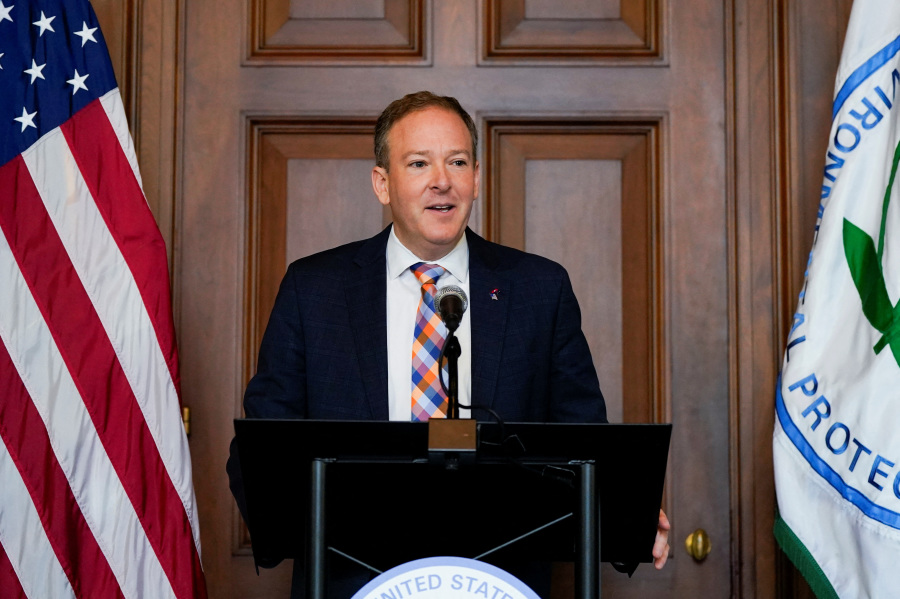WASHINGTON (Reuters) -President Donald Trump's administration has proposed repealing rules passed under former President Joe Biden to curb emissions of carbon dioxide, mercury and other air pollutants from power plants, Environmental Protection Agency Administrator Lee Zeldin said on Wednesday.
The announcement, following through on a promise EPA made in March, is a key step in Trump's broader efforts to unwind environmental regulations he views as unnecessary barriers to industrial development and expanded energy production.
"EPA is taking an important step, reclaiming sanity and sound policy, illustrating that we can both protect the environment and grow the economy," Zeldin said at EPA headquarters.
Electric utilities and miners cheered the move to eliminate the Biden-era rules, which Zeldin said would save companies $120 million a year. Environmental groups slammed the proposal, saying it would cost more than that in damage to the environment and public health.
In March, Zeldin announced his intent to unwind three dozen existing agency air and water rules. Wednesday's announcement focuses on carbon emission and mercury regulations and launches the formal process to repeal those regulations.
The EPA has already exempted 47 companies from regulations to curb mercury and air toxics for coal-fired power plants for two years, according to a list of facilities published by the EPA in April.
That move was intended to prevent power plants from having to retire as the U.S. faces an expected jump in electricity demand linked to a surge in data center construction.
Zeldin said data centers will consume 10% of U.S. electricity supply within 10 years, up from 3 to 4% currently, so more gas and coal power will be needed to "make America the AI capital of the world."
Biden's carbon emission rules for power plants would have reduced greenhouse gas emissions by 1 billion metric tons by 2047, a crucial part of his administration's fight against climate change.
The electricity sector is responsible for nearly a quarter of U.S. greenhouse gas pollution.
Zeldin said the rules, if finalized, would mean no power plant would be able to emit more than it emits today or as much as it did a year or two ago.
The proposal has two parts: the first would repeal the carbon pollution standards finalized last year by the Biden EPA calling for carbon emission reductions from existing coal- and new gas-fired power plants. The second, which Zeldin said would save $120 million a year, would repeal Biden's move to strengthen the 2012 mercury and air toxics rule, requiring continuous monitoring requirements.
American Lung Association President Harold Wimmer said the mercury limit rollback was “indefensible from a public health standpoint and a betrayal of EPA’s mission."
Shaun Goho, legal director at Clean Air Task Force, said: “These regressive proposals are bad for public health and bad for climate, all to prop up some of the highest polluting power plants in the nation."
"Eliminating Biden-era power plant standards will erase $240 billion in climate benefits and $120 billion in public health savings," said Evergreen Action Senior Power Sector Policy Lead Charles Harper.
Alex Bond, director of legal policy at the Edison Electric Institute, said: “Regulatory flexibility and certainty are critical for electric companies as they work to meet the nation’s growing demands for reliable electricity, while also keeping customer bills as low as possible."
EEI said it still supports the EPA's authority to regulate greenhouse gas emissions under the federal Clean Air Act.
National Mining Association President Rich Nolan said nullifying the EPA's two most consequential air rules removes "deliberately unattainable standards and leveling the playing field for reliable power sources, instead of stacking the deck against them."
U.S. Representative Rob Bresnahan, a Pennsylvania Republican whose district will have nine new data center projects in coming years, said repealing the power plant rules will enable more gas plants to come online to help power surging electricity demand.
"The simple fact is we need more power on the grid to power all of this," he said.
(Reporting by Valerie Volcovici; Editing by Hugh Lawson; editing by Diane Craft and David Gregorio)











News magazine bootstrap themes!
I like this themes, fast loading and look profesional
Thank you Carlos!
You're welcome!
Please support me with give positive rating!
Yes Sure!